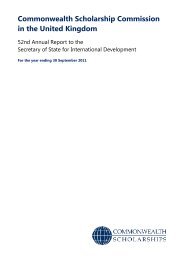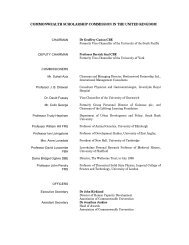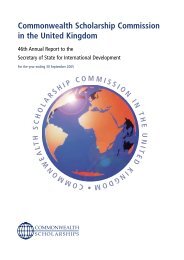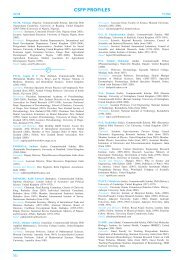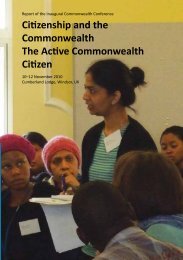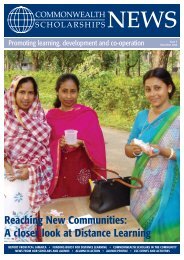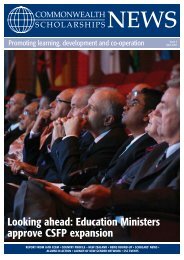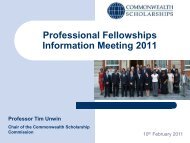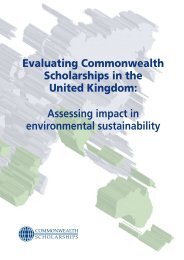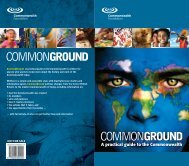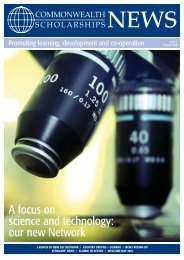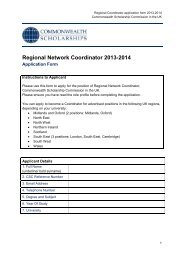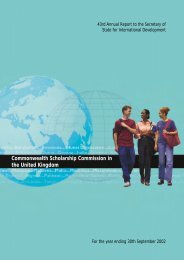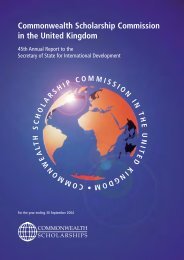Directory of Commonwealth Scholars and Fellows 1959-2009
Directory of Commonwealth Scholars and Fellows 1959-2009
Directory of Commonwealth Scholars and Fellows 1959-2009
You also want an ePaper? Increase the reach of your titles
YUMPU automatically turns print PDFs into web optimized ePapers that Google loves.
<strong>Directory</strong> <strong>of</strong> <strong>Commonwealth</strong><br />
<strong>Scholars</strong> <strong>and</strong> <strong>Fellows</strong><br />
<strong>1959</strong>-<strong>2009</strong><br />
Supported by the <strong>Commonwealth</strong> <strong>Scholars</strong>hip Commission in the United Kingdom <strong>and</strong> the Department <strong>of</strong> Foreign<br />
Affairs <strong>and</strong> International Trade in Canada
Cover photos:<br />
Front (l-r, from top row)<br />
• Zinta Zommers, (Canada) <strong>Commonwealth</strong> Scholar, DPhil (Virology <strong>of</strong> Wildlife), University <strong>of</strong> Oxford, United Kingdom (2005-present), at a<br />
planning meeting for GEO-4, the United Nations Environment Programme’s flagship report.<br />
• Achintya Dutta, (India) <strong>Commonwealth</strong> Fellow (History <strong>of</strong> Public Health), School <strong>of</strong> Oriental <strong>and</strong> African Studies, United Kingdom (2002-2003),<br />
presenting at a medical history conference that he co-organised.<br />
• Hamish Nixon, (Canada) <strong>Commonwealth</strong> Scholar, DPhil (Politics), University <strong>of</strong> Oxford, United Kingdom (1998-2002), at a research consultation<br />
on community-driven development <strong>and</strong> local governance initiatives in western Afghanistan (bottom left).<br />
• Preeti Kana Paul, (Bangladesh) <strong>Commonwealth</strong> Scholar, MSc (Aquaculture), University <strong>of</strong> Stirling, United Kingdom (2005-present), by distance<br />
learning, completing a water analysis exercise.<br />
• Cornelia Ndifon, (Nigeria) <strong>Commonwealth</strong> Scholar, MPH (Public Health (International)) University <strong>of</strong> Leeds, United Kingdom (2003-2004), at<br />
work at an HIV/AIDS care <strong>and</strong> treatment centre in Guyana.<br />
• Phutiane Alwyn Rapatsa, (South Africa) <strong>Commonwealth</strong> Scholar, MSc (International Primary Health Care), University College London, United<br />
Kingdom (2006-present), by distance learning, performing an upper abdominal ultrasound on a patient.<br />
• Damjan Vukcevic, (Australia) <strong>Commonwealth</strong> Scholar, DPhil (Statistics), University <strong>of</strong> Oxford, United Kingdom (2005-2008), <strong>and</strong> Joanne Gale,<br />
(Australia) <strong>Commonwealth</strong> Scholar, DPhil (Statistics), University <strong>of</strong> Oxford, United Kingdom (2005-2008), with the published results <strong>of</strong> their<br />
genetics study.<br />
• Clement Gonah, (Nigeria) <strong>Commonwealth</strong> Scholar, MSc (Ceramic Science <strong>and</strong> Engineering), University <strong>of</strong> Sheffield (2003-2004), working on his<br />
award-winning glass waste processing machine.<br />
• Harriette Smith, (Saint Lucia) <strong>Commonwealth</strong> Fellow (Public Health), St Lucia Diabetes Project, United Kingdom (2006), attending to a patient’s<br />
feet in her role as a Family Nurse Practitioner.<br />
• Ruth Lugwisha, (Tanzania) <strong>Commonwealth</strong> Fellow (Environment Governance), Environment Agency, United Kingdom (2007), examining l<strong>and</strong>fill<br />
liner used in modern l<strong>and</strong>fills in the UK (left).<br />
Back (l-r, from top row)<br />
• Buba Ahmed, (Nigeria) <strong>Commonwealth</strong> Fellow (Agricultural Entomology), Swansea University, United Kingdom (2006-2007), conducting<br />
research into environmentally-friendly alternatives to chemical pesticides.<br />
• Charles Melnyk, (Canada) <strong>Commonwealth</strong> Scholar, PhD (Plant Biology), University <strong>of</strong> Cambridge, United Kingdom (2006-present), researching<br />
the role <strong>of</strong> small RNAs as regulators <strong>of</strong> leaf form <strong>and</strong> development.<br />
• Anoja Wickramasinghe, (Sri Lanka) <strong>Commonwealth</strong> Scholar, PhD (Forest Ecology), University <strong>of</strong> Sheffield, United Kingdom (1980-1983),<br />
distributing plants to remote communities to aid sustainability.<br />
• Lynn Kuok, (Singapore) <strong>Commonwealth</strong> Scholar, PhD (Political Science), University <strong>of</strong> Cambridge, United Kingdom (2007-2008), studying<br />
ethnic relations in South East Asia.<br />
• Benson Kuria, (Kenya) <strong>Commonwealth</strong> Scholar, Split-Site PhD (Plant Ecology), University <strong>of</strong> Nottingham, United Kingdom (2007-present)<br />
[Jomo Kenyatta University <strong>of</strong> Agriculture <strong>and</strong> Technology, Kenya], examining plants as part <strong>of</strong> his research into potential bi<strong>of</strong>uel species.<br />
• James Br<strong>and</strong>ful, (Ghana) <strong>Commonwealth</strong> Scholar, Split-Site PhD (Molecular Virology), University <strong>of</strong> Cambridge, United Kingdom (2006-2007)<br />
[University <strong>of</strong> Ghana], analysing samples as part <strong>of</strong> his research into HIV/AIDS in Ghana.<br />
• Julia Latham, (United Kingdom) <strong>Commonwealth</strong> Scholar, MSc (Biological Sciences), University <strong>of</strong> Auckl<strong>and</strong>, New Zeal<strong>and</strong> (2004-2007), with a<br />
kiwi, the subject <strong>of</strong> her Master’s study.<br />
• Pamela Chilubanama, (Zambia) <strong>Commonwealth</strong> Scholar, PhD (Environmental Law), University <strong>of</strong> Manchester, United Kingdom (2007-present),<br />
at the 2007 Welcome Day for newly-arrived <strong>Scholars</strong> <strong>and</strong> <strong>Fellows</strong> in the UK.<br />
• Monirul Khan, (Bangladesh) <strong>Commonwealth</strong> Scholar, PhD (Wildlife Biology), University <strong>of</strong> Cambridge, United Kingdom (2000-2004), in the<br />
Sundarbans mangrove forest in Bangladesh, working on the conservation <strong>of</strong> tigers.<br />
• Adonna Jardine-Comrie, (Saint Vincent <strong>and</strong> The Grenadines) <strong>Commonwealth</strong> Scholar, Split-Site PhD (Education for Sustainable Development),<br />
University <strong>of</strong> Liverpool (2007-2008) [University <strong>of</strong> the West Indies, Mona Campus, Jamaica], researching the formal <strong>and</strong> informal curricula <strong>of</strong><br />
Jamaican schools.<br />
Published by<br />
The Association <strong>of</strong> <strong>Commonwealth</strong> Universities<br />
Woburn House<br />
20-24 Tavistock Square<br />
London WC1H 9HF<br />
Telephone: +44 (0)20 7380 6700<br />
Fax: +44 (0)20 7387 2655<br />
www.acu.ac.uk<br />
A CIP catalogue record for this book is available from the British Library.<br />
ISBN: 978-0-85143-195-6<br />
First published 2003<br />
2nd edition <strong>2009</strong><br />
© The Association <strong>of</strong> <strong>Commonwealth</strong> Universities <strong>2009</strong><br />
All rights reserved. No part <strong>of</strong> this publication may be reproduced, stored in a retrieval system, or transmitted, in any form or by any means, electronic,<br />
mechanical, photocopying, recording or otherwise, without the prior written permission <strong>of</strong> the publisher.<br />
The <strong>Directory</strong> is published for information purposes only <strong>and</strong> no liability is accepted for its contents by the Association <strong>of</strong> <strong>Commonwealth</strong> Universities.<br />
While all reasonable efforts have been made to ensure that the information it contains was correct at the time <strong>of</strong> compilation, no responsibility is<br />
accepted for the accuracy <strong>of</strong> such information, which is largely dependent on the questionnaires returned <strong>and</strong> existing records.<br />
Typeset by David Lewis XML Associates Ltd<br />
Cover design by Chris Monk (www.yellowduck.net)<br />
Printed in the UK by Polestar Wheatons, Exeter, UK
Contents<br />
v<br />
Foreword<br />
vii<br />
Preface<br />
xi<br />
Acknowledgements<br />
xiii<br />
Notes on the data<br />
1 Pr<strong>of</strong>iles <strong>of</strong> <strong>Commonwealth</strong> <strong>Scholars</strong> <strong>and</strong> <strong>Fellows</strong><br />
283 Register <strong>of</strong> <strong>Commonwealth</strong> <strong>Scholars</strong> <strong>and</strong> <strong>Fellows</strong>
Foreword<br />
The decision <strong>of</strong> <strong>Commonwealth</strong> Education Ministers, at their first conference in <strong>1959</strong>, to<br />
establish a programme <strong>of</strong> scholarships <strong>and</strong> fellowships said much about their aspirations for<br />
the newly exp<strong>and</strong>ed <strong>Commonwealth</strong>. Even the most optimistic, however, could not have<br />
anticipated the long-term benefits <strong>of</strong> their foresight.<br />
50 years later, the <strong>Commonwealth</strong> <strong>Scholars</strong>hip <strong>and</strong> <strong>Fellows</strong>hip Plan (CSFP) has supported<br />
some 26,000 individuals. Citizens from all <strong>Commonwealth</strong> countries have benefited, while<br />
over 20 countries have hosted awards. The overwhelming majority have returned to their home<br />
country to make a huge difference. Many have risen to the very highest ranks <strong>of</strong> their chosen<br />
pr<strong>of</strong>essions.<br />
The CSFP has become one <strong>of</strong> the cornerstones <strong>of</strong> <strong>Commonwealth</strong> collaboration. It is another<br />
<strong>of</strong> the most distinctive <strong>Commonwealth</strong> ‘br<strong>and</strong> names’. A huge debt <strong>of</strong> thanks is due to the<br />
United Kingdom, which undertook to be the largest contributor in <strong>1959</strong> <strong>and</strong> whose support<br />
remains vital. But thanks are also due to countries such as Canada, where the idea for the<br />
scheme originated, <strong>and</strong> to India <strong>and</strong> New Zeal<strong>and</strong>, who with Canada have been among the<br />
most consistent contributors. We are in debt to all those countries which have supported<br />
awards. The numbers may not have been as great, but the ability <strong>of</strong> students from, say, Africa<br />
to study in Malaysia, Brunei, or the Caribbean says much about the relevance <strong>of</strong> the modern<br />
<strong>Commonwealth</strong>.<br />
This new <strong>Directory</strong> <strong>of</strong> alumni is a unique testament to these achievements. The number <strong>of</strong><br />
career pr<strong>of</strong>iles has doubled since the first edition produced in 2003, <strong>and</strong> the number <strong>of</strong> names<br />
listed has increased from 20,000 to over 25,000. The essential message <strong>of</strong> the first <strong>Directory</strong>,<br />
though, is reinforced. <strong>Commonwealth</strong> <strong>Scholars</strong>hips have been a wonderful investment,<br />
producing real leaders. I hope that governments <strong>and</strong> <strong>Commonwealth</strong> agencies will make use<br />
<strong>of</strong> the contacts provided to involve our alumni still further.<br />
In June <strong>2009</strong>, at the 17th Conference <strong>of</strong> <strong>Commonwealth</strong> Education Ministers in Kuala Lumpur,<br />
Education Ministers will consider proposals to take the CSFP into its next half century. These<br />
will aim to make the Plan even more international, flexible <strong>and</strong> relevant than ever, with a new<br />
endowment fund to be set up to allow more low <strong>and</strong> middle income countries to host scholars.<br />
We are calling the appeal the ‘once in a lifetime’ appeal: we will make one approach to new<br />
donors, <strong>and</strong> <strong>of</strong>fer one, magnificent, once-in-a-lifetime chance for those who win awards, <strong>and</strong><br />
thereby see a world <strong>of</strong> opportunity unfolding. It is a huge task, but Ministers have given us<br />
firm foundations on which to build. We can only ask that they show as much foresight as their<br />
predecessors <strong>of</strong> fifty years ago.<br />
Kamalesh Sharma<br />
<strong>Commonwealth</strong> Secretary-General<br />
v
Preface<br />
<strong>Scholars</strong>hip providers have never been under greater pressure to demonstrate the impact <strong>of</strong> their investment.<br />
Following the subsequent careers <strong>of</strong> award holders, through alumni programmes, is an obvious route to meeting this<br />
need.<br />
This, the second edition <strong>of</strong> the <strong>Directory</strong> <strong>of</strong> <strong>Commonwealth</strong> <strong>Scholars</strong> <strong>and</strong> <strong>Fellows</strong>, provides more evidence about the<br />
progress <strong>of</strong> former <strong>Commonwealth</strong> <strong>Scholars</strong> than has ever been assembled in one place before. The pages that follow<br />
contain some 3,700 career pr<strong>of</strong>iles <strong>of</strong> former award holders, <strong>and</strong> the names <strong>and</strong> dates <strong>of</strong> 25,000.<br />
The <strong>Directory</strong> will be <strong>of</strong> immense use to national governments, the <strong>Commonwealth</strong> Secretariat <strong>and</strong> other<br />
<strong>Commonwealth</strong> <strong>and</strong> international organisations in identifying former award holders <strong>and</strong> possibly involving them in<br />
their work. What, though, does it tell us about the wider impact <strong>of</strong> the scheme?<br />
What does the <strong>Directory</strong> tell us?<br />
Governments <strong>of</strong>fer scholarships for a variety <strong>of</strong> reasons. When the <strong>Commonwealth</strong> <strong>Scholars</strong>hip <strong>and</strong> <strong>Fellows</strong>hip Plan<br />
(CSFP) was established at the first ever <strong>Commonwealth</strong> education conference in <strong>1959</strong>, it was intended first <strong>and</strong><br />
foremost to support individuals. Awards would ‘recognise <strong>and</strong> promote the highest level <strong>of</strong> intellectual achievement’.<br />
Subsequently, some donor countries have aligned their awards more closely to international development objectives.<br />
Others have actively sought to identify ‘future leaders’ – individuals whose friendship <strong>and</strong> influence would be useful<br />
to the host country in future years. More recently, as global competition for talent has intensified, host governments<br />
have seen scholarships as a way <strong>of</strong> maintaining the international pr<strong>of</strong>ile <strong>of</strong> their universities <strong>and</strong> even attracting<br />
highly qualified individuals in the long term.<br />
All <strong>of</strong> these factors play a role in <strong>Commonwealth</strong> <strong>Scholars</strong>hips <strong>and</strong> <strong>Fellows</strong>hips. Canada, for example, has in recent<br />
years introduced postdoctoral fellowships to its portfolio, an idea also being trialled in South Africa. The United<br />
Kingdom has added distance learning awards <strong>and</strong> short-term fellowships for mid-career pr<strong>of</strong>essionals to its<br />
longst<strong>and</strong>ing support for postgraduate work. This flexibility is welcome, <strong>and</strong> was anticipated by the founders in<br />
<strong>1959</strong>, in their far-sighted statement that the Plan should be sufficiently flexible to respond to future needs.<br />
It is fair to say that, over the 50 years <strong>of</strong> their existence, the objectives <strong>of</strong> <strong>Commonwealth</strong> <strong>Scholars</strong>hips <strong>and</strong><br />
<strong>Fellows</strong>hips have moved more towards those <strong>of</strong> society than the individual. The emphasis on individual merit,<br />
however, remains strong – <strong>and</strong> rightly so. However objectives may change, they are most likely to be achieved by<br />
individuals with high academic merit, combined with the motivation <strong>and</strong> the ability to make a real difference.<br />
Insistence on qualities such as these, combined with rigorous selection procedures, is largely responsible for the<br />
reputation that <strong>Commonwealth</strong> <strong>Scholars</strong>hips enjoy today.<br />
Higher education is the largest single career for alumni under the scheme. This is not surprising, for a number <strong>of</strong><br />
reasons. The UK, in particular, reserves a proportion <strong>of</strong> its awards for young <strong>and</strong> mid-career academic staff from<br />
developing countries, with the express intention that they should return to their home institutions following their<br />
studies. For many recipient countries, universities are the obvious employer to best utilise high-quality talent.<br />
Against this background, <strong>Commonwealth</strong> <strong>Scholars</strong>hips can proudly boast that they have continually supported<br />
higher education at a time – particularly in the late 1980s <strong>and</strong> 1990s – when the prevailing fashion amongst<br />
development agencies was not to do so. The success <strong>of</strong> the scheme in so doing is one <strong>of</strong> the most strikingly obvious<br />
features <strong>of</strong> the pr<strong>of</strong>iles listed in this volume.<br />
Reading through the pr<strong>of</strong>iles, however, it is also clear that support for higher education contributes to a much wider<br />
impact. Not only are CSFP alumni responsible for teaching presumably millions <strong>of</strong> the next generation, but their<br />
research touches on virtually all areas <strong>of</strong> life. Hundreds <strong>of</strong> alumni, whose first career has been in academia, are used<br />
by governments <strong>and</strong> international bodies as consultants or specialist advisers; many move in <strong>and</strong> out <strong>of</strong> government<br />
during their careers. In a recent survey conducted by the <strong>Commonwealth</strong> <strong>Scholars</strong>hip Commission in the United<br />
Kingdom, 45% <strong>of</strong> the 2,226 respondents could cite at least one occasion on which they felt that they had influenced<br />
the thinking or policies <strong>of</strong> their government.<br />
vii
Yet it would be a huge mistake to regard the CSFP as primarily a means <strong>of</strong> supporting higher education. The pr<strong>of</strong>iles<br />
in this <strong>Directory</strong> provide the best possible evidence that <strong>Commonwealth</strong> <strong>Scholars</strong>hips produce leaders in all walks<br />
<strong>of</strong> life – politics, civil service, law, business, journalism, literature <strong>and</strong> many, many more. And if this is true <strong>of</strong> the<br />
alumni <strong>of</strong> the 1960s, 1970s <strong>and</strong> 1980s, it is perhaps even more likely to be true <strong>of</strong> the modern breed <strong>of</strong> <strong>Scholars</strong>. Not<br />
only are selection committees now more likely to seek wider ‘leadership’ skills, but several <strong>of</strong> the new innovations,<br />
such as undergraduate awards in Canada <strong>and</strong> pr<strong>of</strong>essional fellowships in the UK, are much less focussed on academic<br />
careers. Distance learning scholarships, introduced by the UK in 2002, explicitly target other careers <strong>of</strong> direct<br />
relevance to international development objectives. Taking all this into account, it is likely that the proportion <strong>of</strong><br />
alumni in higher education will decline over the next decade, but that the overall number in the sector will remain<br />
significant.<br />
Less tangible, but also evident, is the impact on wider international relations. The recent UK analysis found that over<br />
90% <strong>of</strong> the 2,226 respondents maintained some sort <strong>of</strong> link with contacts in the UK, a remarkable figure considering<br />
many held their awards over 20 years ago. In total, 70% reported maintaining links with universities in the UK, 48%<br />
with pr<strong>of</strong>essional associations, <strong>and</strong> 72% with social contacts. These findings are supplemented by significant<br />
anecdotal evidence. Perhaps even more striking are the records <strong>of</strong> the relatively small numbers <strong>of</strong> developed country<br />
<strong>Scholars</strong> to have studied in developing <strong>Commonwealth</strong> countries under the scheme, most typically in the 1960s <strong>and</strong><br />
1970s, many <strong>of</strong> whom retain a strong international element throughout their careers – whether in diplomacy,<br />
development or academia. That the number <strong>of</strong> such opportunities waned in the 1980s <strong>and</strong> 1990s, particularly with<br />
the decline in higher education itself in Africa, was a huge loss to the scheme. The decision <strong>of</strong> <strong>Commonwealth</strong><br />
Education Ministers, at their triennial conference in Cape Town, South Africa, in 2006, to make the expansion <strong>of</strong><br />
awards in low <strong>and</strong> middle income countries a priority for the Plan’s 50th anniversary through the creation <strong>of</strong> an<br />
endowment fund specifically for the purpose, is hugely welcome in this context.<br />
An obvious indicator <strong>of</strong> impact is the extent to which <strong>Scholars</strong> <strong>and</strong> <strong>Fellows</strong> return to their home country after their<br />
awards. Study abroad is sometimes cited as a cause <strong>of</strong> brain drain, <strong>and</strong> a recent UK report suggested that some 40%<br />
<strong>of</strong> all postgraduate students aspire to stay following their study. Migration on this scale is not the experience <strong>of</strong> the<br />
CSFP. As our samples have grown over the years, surveys <strong>of</strong> <strong>Commonwealth</strong> <strong>Scholars</strong> <strong>and</strong> <strong>Fellows</strong> who studied in<br />
the UK have constantly shown a figure <strong>of</strong> 85-90% working in their home country or region. An analysis from Canada<br />
in 2003 placed the figure a little lower, but still well over two-thirds. In both cases, there is every expectation that<br />
this figure will continue to be at least as high, due in no small part to the introduction <strong>of</strong> distance learning <strong>and</strong> shortterm<br />
undergraduate scholarships by the respective host countries. There is, moreover, increasing evidence that the<br />
question <strong>of</strong> ‘whether the student has returned home’ is now too simplistic. An increasing number <strong>of</strong> talented people<br />
now divide their careers between countries, whilst many <strong>of</strong> those not working in their home country at the time <strong>of</strong><br />
survey are still making huge contributions, <strong>of</strong>ten through research or working for international organisations.<br />
A representative sample?<br />
The career pr<strong>of</strong>iles presented in the <strong>Directory</strong> provide a striking testimony to the achievements <strong>of</strong> individual<br />
<strong>Commonwealth</strong> <strong>Scholars</strong>. However, given that some 26,000 individuals have held such awards, <strong>and</strong> over 16,000 in<br />
the UK alone, it is reasonable to ask whether the sample is a ‘representative’ one.<br />
It is worth stressing that the pr<strong>of</strong>iles are not intended to be a ‘Who’s Who’ <strong>of</strong> only the most prestigious alumni, but<br />
rather to include all <strong>of</strong> those for whom we have the necessary records <strong>and</strong> permission. Data protection laws in the<br />
UK require that individual consent be given before any pr<strong>of</strong>ile is published. In fact, the Commission’s alumni<br />
programme is in contact with almost 6,000 alumni in total – including many highly prestigious figures for whom we<br />
were unable to obtain the necessary consent in time for publication. It is also worth saying that, although the number<br />
<strong>of</strong> pr<strong>of</strong>iles in this <strong>Directory</strong> is about double that in the 2003 version, the main trends – such as sector <strong>of</strong> employment<br />
<strong>and</strong> country <strong>of</strong> origin – remain constant.<br />
One bias that is fairly easy to detect, however, is that <strong>of</strong> age. Over half <strong>of</strong> the new pr<strong>of</strong>ile entries completed their<br />
awards since 2000. Most <strong>of</strong> these remain in early or mid career. This feature is likely to underplay, rather than<br />
exaggerate, the achievements <strong>of</strong> the scheme, since it is reasonable to assume that the majority have yet to obtain<br />
their most senior positions. In evaluating the impact <strong>of</strong> scholarships generally, it is important to recognise that, while<br />
the cost <strong>of</strong> awards is incurred within a relatively short period <strong>of</strong> time, the benefits accrue over a much longer period.<br />
viii
Secondly, the pr<strong>of</strong>iles listed here are primarily those <strong>of</strong> individuals who have held their <strong>Commonwealth</strong> <strong>Scholars</strong>hips<br />
or <strong>Fellows</strong>hips in Canada or the UK. This reflects both the fact that these two countries have been the largest donors<br />
to the Plan since its formation, <strong>and</strong> that they are the countries with the best developed alumni programmes. From the<br />
‘Register’ section <strong>of</strong> the <strong>Directory</strong>, however, it will be seen that over 20 countries have <strong>of</strong>fered awards at some stage<br />
over the 50 years <strong>of</strong> the Plan, <strong>and</strong> that some, such as India <strong>and</strong> New Zeal<strong>and</strong>, are consistent contributors. No<br />
publication that fails to reflect this, or the contribution <strong>of</strong> other recent donors such as Jamaica, Brunei Darussalam,<br />
South Africa, Ghana, Trinidad <strong>and</strong> Tobago <strong>and</strong> Malaysia, can fully reflect the diverse nature <strong>of</strong> the scheme. Happily,<br />
a number <strong>of</strong> other countries are now developing their own alumni activity. Together with the increase in awards in<br />
low <strong>and</strong> income countries anticipated following the 50th anniversary endowment fund appeal, we hope that this will<br />
provide for greater representation in future.<br />
Looking to the future<br />
We believe that the <strong>Directory</strong> provides one <strong>of</strong> the most comprehensive records <strong>of</strong> any international scholarship<br />
scheme ever produced. In many ways, however, it is intended to be starting point for other activities, rather than an<br />
outcome in its own right.<br />
The <strong>Directory</strong> will, we hope, be widely used by governments, their High Commissions, international organisations<br />
<strong>and</strong> others to identify expertise <strong>and</strong> to maintain links, thus further increasing the impact <strong>of</strong> the programme. It will<br />
also help national governments <strong>and</strong> individual universities in developing their own alumni programmes. The contacts<br />
here also provide an excellent basis for more rigorous evaluation <strong>of</strong> the scheme, such as that on which the UK has<br />
already embarked.<br />
Knowledge <strong>of</strong> our alumni also opens opportunities for new forms <strong>of</strong> communication with <strong>and</strong> between them. In the<br />
UK, an important feature <strong>of</strong> our alumni activity in recent years has been the development <strong>of</strong> networks based on<br />
pr<strong>of</strong>ession, rather than home country. Nine such networks exist at the time <strong>of</strong> writing – in gender; health; education;<br />
governance, civil society <strong>and</strong> community development; environment; agriculture/rural development; science <strong>and</strong><br />
technology; law; <strong>and</strong> faiths <strong>and</strong> civil society. These provide an excellent basis for electronic networking on issues<br />
directly relevant to the day-to-day careers <strong>of</strong> alumni, <strong>and</strong> are well supported. We look forward to developing these<br />
networks further.<br />
We hope, too, that the concrete evidence <strong>of</strong> the <strong>Directory</strong> will provide member governments <strong>of</strong> the <strong>Commonwealth</strong><br />
with the confidence to maintain <strong>and</strong> exp<strong>and</strong> their own contributions. At a time when higher education is exp<strong>and</strong>ing,<br />
<strong>and</strong> its contribution to wider economic <strong>and</strong> social goals is recognised more widely than ever, the potential <strong>of</strong> the<br />
scheme has never been greater. It falls to <strong>Commonwealth</strong> Education Ministers, who meet for their 17th conference<br />
in Kuala Lumpur, Malaysia, in June <strong>2009</strong>, to demonstrate the same foresight as their predecessors did at the first<br />
such meeting 50 years ago.<br />
Dr John Kirkl<strong>and</strong><br />
Executive Secretary<br />
<strong>Commonwealth</strong> <strong>Scholars</strong>hip Commission in the United Kingdom<br />
London, March <strong>2009</strong><br />
ix
Acknowledgements<br />
The collection <strong>of</strong> data for this <strong>Directory</strong>, <strong>and</strong> its organisation into the format produced here, has been a substantial<br />
exercise, spread over several months. Thanks are due to many individuals for contributing, in many cases fitting in<br />
the time to do so alongside their other duties.<br />
Within the UK, production was coordinated by Julie Stackhouse <strong>and</strong> Jocelyn Law. It was, however, a genuine team<br />
effort involving ACU staff at various stages, including Sabina Ebbols, Selina Hannaford, Sarah Humphreys, Jonathan<br />
Jenkins, Natasha Lokhun, Nick Mulhern, Anna O’Flynn, James Ransom <strong>and</strong> Arvinder Sansoa. Editorial assistance<br />
was provided by Matt Grange <strong>and</strong> Paul Turner, <strong>and</strong> support from Melanie Christou, Gina Evans, Anna Gane, Nicola<br />
Seaton <strong>and</strong> Hannah Urbanczyk. The communications sub-committee <strong>of</strong> the <strong>Commonwealth</strong> <strong>Scholars</strong>hip Commission<br />
– Pr<strong>of</strong>essor Tim Unwin, Dr Mark Collins, Dr Monica Darnbrough <strong>and</strong> Sir Brian Donnelly – also provided valuable<br />
input.<br />
The Canadian survey was coordinated by Jennifer Humphries, Diane Cyr, Natalia Amiel <strong>and</strong> colleagues at the<br />
Canadian Bureau <strong>of</strong> International Education. That work was in turn facilitated by Chris Greenshields <strong>and</strong> Natalija<br />
Marjanovic <strong>of</strong> the Department for Foreign Affairs <strong>and</strong> International Trade (DFAIT).<br />
Additional tracing activities were undertaken by Eugenia Asare, Lem Atanga, Sulieman Fye, Dineo Ketshogileng,<br />
Jackie Olang, Kay Raseroka <strong>and</strong> Jenny Unwin.<br />
Updated information for the register was also provided by agencies in India, New Zeal<strong>and</strong>, Malaysia <strong>and</strong> South<br />
Africa.<br />
DFAIT also made a valuable financial contribution to the final production, as did the <strong>Commonwealth</strong> <strong>Scholars</strong>hip<br />
Commission in the United Kingdom.<br />
Thanks are due to all <strong>of</strong> the above, but perhaps our greatest gratitude should be reserved for the hundreds <strong>of</strong><br />
individuals throughout the world who have taken the time to complete their questionnaires, or provide information<br />
regarding other alumni. It is their enthusiasm, most <strong>of</strong> all, which has made the project worthwhile.<br />
xi
Notes on the data<br />
Pr<strong>of</strong>iles<br />
This data has been compiled from questionnaires returned, mostly online, to the <strong>Commonwealth</strong> <strong>Scholars</strong>hip<br />
agencies in the UK <strong>and</strong> Canada. For studies in the UK, our existing information on the individual’s award has also<br />
been used.<br />
Country<br />
The country given in brackets after an individual’s name refers to the country <strong>of</strong> nomination (which is not always<br />
the same as country <strong>of</strong> origin).<br />
Scheme<br />
<strong>Commonwealth</strong> Scholar refers to all studies at undergraduate, Master’s or doctoral level, <strong>and</strong> includes early<br />
postdoctoral research awards. Where studies were conducted by distance learning, this is indicated at the end <strong>of</strong> the<br />
award information. Where the award was for a split-site PhD, the UK institution is included in the pr<strong>of</strong>ile <strong>and</strong> the<br />
home (degree-awarding) institution is indicated in square brackets at the end <strong>of</strong> the award information.<br />
<strong>Commonwealth</strong> Fellow refers to continuing pr<strong>of</strong>essional development awards, including those to academics for<br />
training <strong>and</strong> research at postdoctoral level. Both categories contain other award types such as Medical <strong>Scholars</strong>hips<br />
<strong>and</strong> Medical <strong>Fellows</strong>hips.<br />
Course <strong>of</strong> study<br />
For studies in the UK, degree, subject, institution <strong>and</strong> dates <strong>of</strong> award are taken from existing data <strong>and</strong> reflect what<br />
our records show was studied while on award, <strong>and</strong> not necessarily qualifications gained. For award holders studying<br />
in other countries, we have taken information on studies directly from respondents.<br />
Institution<br />
Institutions are generally referred to by their current names, which may have changed since the period <strong>of</strong> award.<br />
Dates <strong>of</strong> study<br />
Dates <strong>of</strong> study for those who studied in the UK mainly reflect our records <strong>of</strong> the period <strong>of</strong> the award, rather than the<br />
period that the award holder was in the country. For those who studied in Canada, if an award holder has had two<br />
awards <strong>and</strong> only one set <strong>of</strong> dates is shown, this includes both awards.<br />
Currently/Previously<br />
This refers to employment, other <strong>of</strong>fices <strong>and</strong> memberships. Respondents were not specifically asked to provide<br />
information in separate sections for current <strong>and</strong> previous positions so, as far as possible, this has been ascertained<br />
from the data given on the questionnaire. In the case <strong>of</strong> reprinted pr<strong>of</strong>iles (see below), where a country is not stated,<br />
posts <strong>and</strong> awards were usually held in the country <strong>of</strong> nomination.<br />
Awards <strong>and</strong> Honours<br />
Information in this section to some extent reflects what each individual has chosen to include in the questionnaire.<br />
National awards <strong>and</strong> distinctions can be found in this section, rather than being included in the name <strong>of</strong> the individual.<br />
Information omitted<br />
For the sake <strong>of</strong> brevity, not all information given on questionnaires has been incorporated into the <strong>Directory</strong>.<br />
Reprinted pr<strong>of</strong>iles<br />
We have reprinted pr<strong>of</strong>iles that appeared in the 2003 edition <strong>of</strong> the <strong>Directory</strong> where the respondent did not reply to<br />
requests to provide updated information for this edition, unless we have been notified that the individual is deceased.<br />
These are marked with a *.<br />
xiii
Register<br />
This section lists the names <strong>of</strong> nearly all award holders under the <strong>Commonwealth</strong> <strong>Scholars</strong>hip <strong>and</strong> <strong>Fellows</strong>hip Plan.<br />
This data is compiled from our records for studies in the UK, the <strong>Commonwealth</strong> <strong>Scholars</strong>hip <strong>and</strong> <strong>Fellows</strong>hip Plan<br />
reports up to 1992, <strong>and</strong> data provided by certain country agencies post-1992. The listing is not complete, as we do<br />
not yet have data on all scholars studying in all countries post-1992.<br />
Country<br />
Award holders are listed by host country, followed by country <strong>of</strong> nomination. Countries are referred to by their<br />
present names. However, in some cases, it was not possible to determine the corresponding individual present-day<br />
location. For example, in some instances, the Plan reports listed a region or two countries combined. In the case <strong>of</strong><br />
pre-1971 award holders listed as nominated by Pakistan, it was not possible to determine whether they were from<br />
what is now Bangladesh. Hong Kong was part <strong>of</strong> the <strong>Commonwealth</strong> until 1997. Some former protectorates are<br />
included in the Plan reports that are not part <strong>of</strong> the present-day <strong>Commonwealth</strong>.<br />
Names<br />
Names were presented in different ways in the Plan reports, <strong>and</strong> in some case no forename was given. We have<br />
incorporated changes <strong>of</strong> name where this is known.<br />
Years<br />
The year, which follows the name in brackets, in most cases refers to the year in which the award was made, <strong>and</strong><br />
may not always be the year in which the award holder travelled to their host country. Where we had sufficient<br />
information to positively identify them, individuals holding more than one award are listed once with multiple years.<br />
Pr<strong>of</strong>iles<br />
The † symbol at the end <strong>of</strong> an entry indicates that this individual has an entry in the Pr<strong>of</strong>iles section <strong>of</strong> the <strong>Directory</strong>.<br />
xiv



